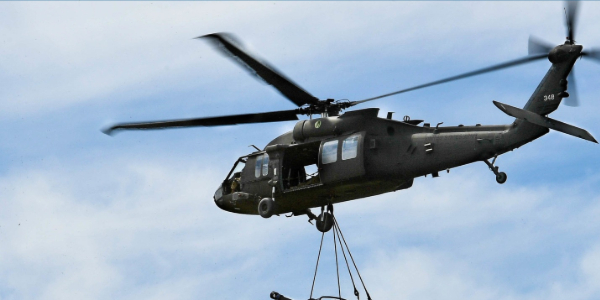UH 60 Technical Specs and Performance Testimonial
UH 60 Technical Specs and Performance Testimonial
Blog Article
The Effect of Sustainable Practices on the Future of Airplane Operations and Emissions Decrease
As the air travel industry deals with boosting examination over its ecological influence, the adoption of sustainable methods emerges as an important pathway toward future aircraft procedures and emissions decrease. Developments in sustainable aeronautics fuels and improvements in hybrid propulsion modern technologies stand at the leading edge of this change, promising substantial decreases in greenhouse gas discharges. Nonetheless, the successful integration of these initiatives pivots on a variety of elements, including governing frameworks and industry collaboration. The concern remains: exactly how will these progressing practices reshape the dynamics of flight and add to a more lasting future?

Overview of Lasting Practices
Sustainable methods in aircraft procedures include a series of strategies targeted at reducing environmental effect while keeping operational efficiency. These techniques are necessary in the air travel market's dedication to decreasing its carbon impact and adhering to international ecological criteria. Secret initiatives consist of enhancing flight paths to minimize fuel usage, improving maintenance procedures to make sure aircraft run at peak effectiveness, and executing advanced innovations such as winglets and light-weight materials that boost the rules of aerodynamics.

Engaging and training personnel on sustainability techniques likewise play a crucial role, fostering a society of ecological responsibility within companies. In general, the assimilation of these lasting methods not just helps decrease discharges yet also enhances the lasting stability of the aviation market, guaranteeing it satisfies the demands of both customers and regulative bodies while adding to global sustainability objectives.
Ingenious Fuel Alternatives
Numerous innovative gas alternatives are emerging as essential options to minimize the air travel market's reliance on conventional nonrenewable fuel sources. Amongst these options, Sustainable Aviation Gas (SAFs) have acquired considerable focus due to their prospective to decrease lifecycle greenhouse gas exhausts by up to 80% compared to conventional jet gas. SAFs are originated from different feedstocks, consisting of waste oils, farming residues, and also algae, making them a versatile alternative for the sector.
One more promising choice is hydrogen gas, which, when made use of in fuel cells, generates just water vapor as a by-product. Furthermore, electric propulsion systems are being discovered, leveraging battery modern technology to power aircraft.
Lastly, biofuels originated from biomass are being checked out, providing an eco-friendly option that can be mixed with traditional gas. Collectively, these innovative gas options stand for a vital step toward accomplishing a sustainable aeronautics community, straightening with international emissions decrease targets and enhancing the sector's environmental stewardship.
Technical Advancements in Air Travel

Just how can technological improvements improve the future of air travel? The combination of cutting-edge innovations click for more info is critical in changing aircraft operations, boosting efficiency, and minimizing exhausts. Developments such as electrical and hybrid propulsion systems are at the leading edge, encouraging substantial decreases in gas intake and greenhouse gas emissions. These systems take advantage of innovations in battery technology and energy management, making it possible for airplane to run with a lower ecological impact.
In addition, the implementation of sophisticated products, such as light-weight composites, adds to improved the rules of aerodynamics and fuel efficiency. Using fabricated intelligence and equipment learning in trip operations maximizes path planning and reduces fuel shed by making it possible for real-time modifications based on weather and traffic problems. Additionally, the growth of self-governing and from another location piloted airplane systems stands to reinvent freight and traveler transportation, potentially raising efficiency while decreasing human error.
Moreover, sustainable air travel modern technologies, consisting of advanced air web traffic management systems, can enhance procedures and decrease congestion, causing lower discharges throughout trip. These improvements jointly represent a paradigm shift in aviation, guaranteeing a future where sustainability and functional efficiency are intertwined, consequently sustaining the industry's commitment to minimizing its ecological influence.

Regulatory Framework and Compliance
Because of the growing emphasis on environmental stewardship within the air travel industry, the governing framework governing aircraft procedures is evolving to advertise sustainable techniques. Governing bodies, such as the International Civil Aviation Company (ICAO) and different national aeronautics authorities, are introducing rigorous standards focused on minimizing emissions and enhancing operational efficiency.
These laws often consist of the adoption of Lasting Aviation Gas (SAF), which has been recognized as a vital element in achieving lower carbon impacts. Conformity with these laws calls for airline companies to execute functional methods and advanced innovations, such as optimized trip visit their website paths and boosted air traffic monitoring, to reduce fuel usage.
Furthermore, the enforcement of discharges trading schemes and carbon balancing out initiatives is coming to be increasingly widespread, compelling airline companies to keep an eye on and report their exhausts properly. Non-compliance can cause significant fines, thus pushing drivers to focus on sustainability in their organization designs.
Ultimately, the progressing regulatory landscape not just drives technology and financial investment in environment-friendly innovations however likewise fosters a culture of liability within the air travel sector. As these frameworks continue to establish, the concentrate on lasting techniques will be important to attaining the industry's long-lasting ecological goals.
Future Trends in Aircraft Operations
As the air travel market adapts to an increasingly rigorous regulative atmosphere, future fads in airplane operations are established to concentrate on cutting-edge services that better boost sustainability and efficiency - uh 60. Secret advancements will likely consist of the fostering of innovative air traffic administration systems, which make use of real-time data and artificial intelligence to optimize flight courses, lowering fuel usage and emissions
One more substantial fad is the raised assimilation of lasting air travel gas (SAFs) These alternatives to conventional jet gas, stemmed from eco-friendly resources, can substantially decrease lifecycle greenhouse gas emissions. The market's commitment to SAFs will likely accelerate as airline companies work together with gas manufacturers to guarantee availability and cost-effectiveness.
Additionally, the press towards electrification and crossbreed propulsion systems is obtaining energy. Arising aircraft layouts will certainly incorporate these innovations, offering quieter and much more efficient operations, especially for short-haul trips.
Final Thought
The adoption of lasting aeronautics gas, paired with developments in electrical and hybrid propulsion systems, is crucial for minimizing lifecycle greenhouse gas discharges. Maximizing flight courses and embracing ingenious modern technologies contribute to a quieter and a lot more environmentally friendly aeronautics sector.
Developments in lasting aviation fuels and innovations in hybrid propulsion innovations stand at the center of this transformation, appealing substantial reductions in greenhouse gas discharges.Countless innovative gas options are arising as pivotal options to reduce the air travel market's reliance on typical fossil fuels - uh 60. Among these options, Sustainable check this Air travel Fuels (SAFs) have gotten considerable focus due to their prospective to reduce lifecycle greenhouse gas exhausts by up to 80% contrasted to standard jet fuels.An additional substantial pattern is the increased combination of sustainable air travel gas (SAFs) The fostering of lasting aviation gas, coupled with improvements in hybrid and electric propulsion systems, is essential for decreasing lifecycle greenhouse gas exhausts
Report this page